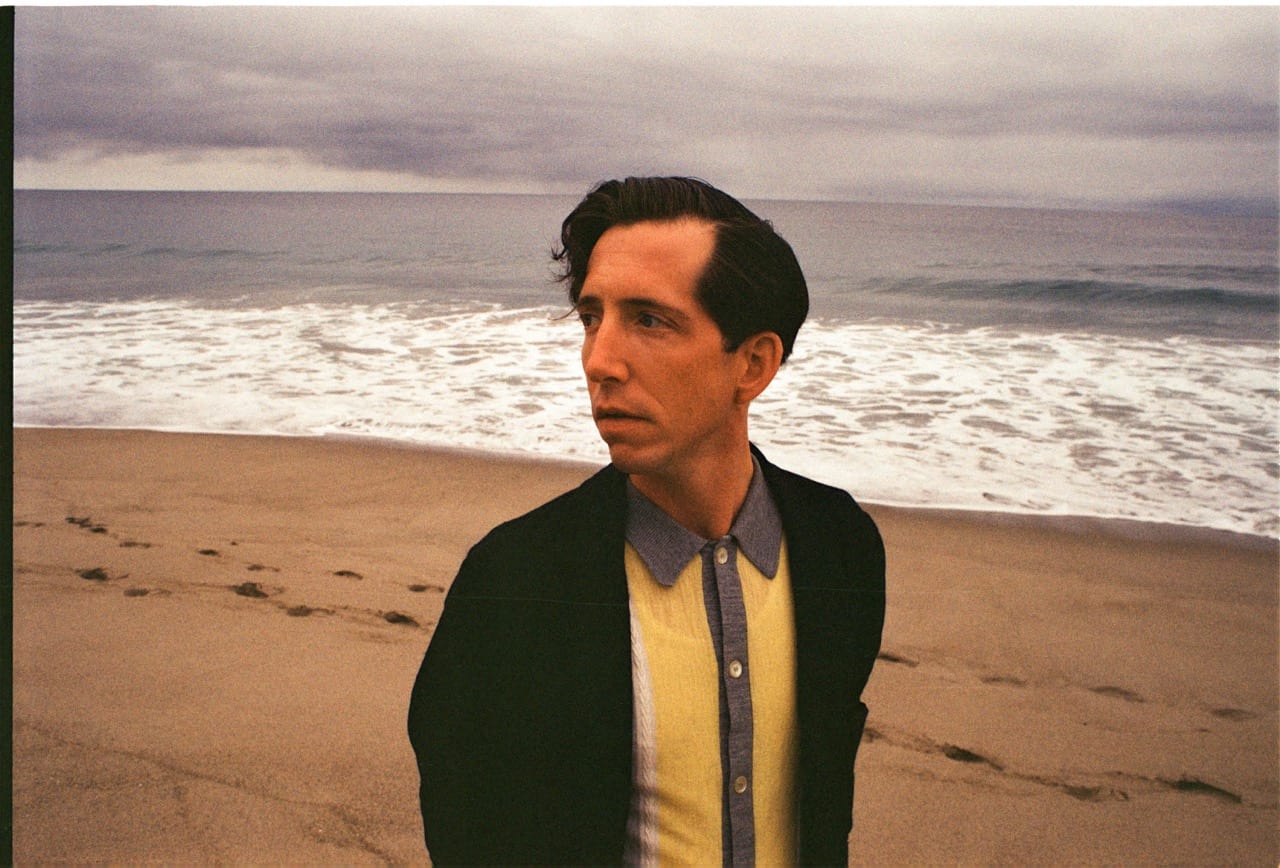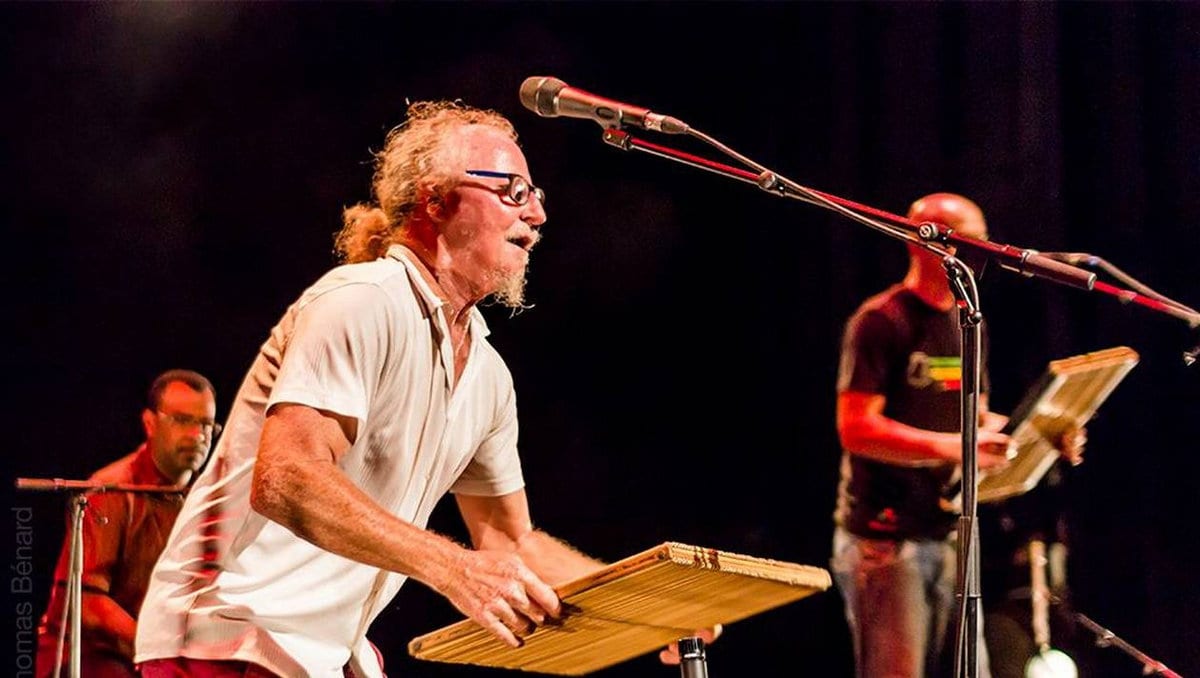SPOTLIGHT: Pokey LaFarge on Danyèl Waro and A Voice Older Than Time

Photo by Larry Niehues
New Plymouth, New Zealand. WOMAD Festival. A hurricane named Lusi moves southeast toward Wellington and the northern South Island on the evening of March 15, 2014. Palm trees bend toward nightfall, toward the sea, bowed in respect. The rain flies from all directions like a night bombing raid in a World War II movie. But the festival-goers — some in head-to-toe protective gear, some in just a poncho, and others wearing nothing at all, going naked — flinch at nothing. Maybe it’s a Kiwi thing … a Southern Hemisphere thing … a spellbinding hurricane. The show goes on. The headliner, a man who looks like a mixture of Einstein and Sean Penn’s character Spicoli from Fast Times at Ridgemont High, comes on stage along with his band. The first sound, his voice, a cappella — part wooden pan pipe, part tropical bird who is crying not singing, with the vibrato reminiscent of the jazz age Johnny Mercer — fills the revelry before the apocalypse. The dance of death.
As he sings in French Creole, eyes closed, hands extended skyward, his nose, his fingers, his eyeglasses drip with rain; the band joins in — vocals only, a mixture of call and response and 4-5 part harmonies. The crowd is transfixed. The band seems to feel this and pauses, until at the first hit of the downbeat from some ancient percussion instrument, the lights go up and the crowd screams, and the band, all voices and hands, no bass, no guitar (no stringed instruments at all), no piano, no horns, is only percussion and voices. Raining, crying … tears mixed with rain … a hurricane … from New Zealand, somewhere in the middle of the Pacific … was my introduction to Danyèl Waro.
Danyèl Waro hails from Réunion, a volcanic island situated between Madagascar and Mauritius in the Indian Ocean, and plays a type of three-beat music native to his homeland called maloya. This Indian Ocean blues, with African, Malagasy, and Indian roots, is one of trance and possession performed with only vocals and percussion instruments: the kayamb, a flat instrument made from cane flower stems with saffron seeds inside; the bobre, a one-string instrument with a gourd resonator, and the roulèr, a large drum constructed with a rum barrel and cowhide. Waro makes all of these himself, but that night in New Zealand he played only the kayamb, which from afar looks like someone playing “hot potato” with a washboard.
Having all but faded away, maloya survived within in a few families before being revived by the Communist Party of Réunion in the 1970s. The music, which preserved dignity and hope in the slaves that created it as well as ancient rituals for contacting ancestral spirits, perhaps as far back as the 17th century, found a renaissance with those who wished to regain their cultural identity in the face of the French colonial power that for centuries had subjugated them.
After joining the Communist Party and leading strikes at his lycée, Waro refused military service in mainland France, of which is mandatory for all Réunionese. He served two years in jail, and in captivity he began writing his first songs (which reminds me so much of what we’ve been told about Fela Kuti’s life and creative awakening in Nigeria in a similar way around the same time).
“When I compose my songs, and try to find the right words, I’m trying to create something that isn’t just partying for partying’s sake, or dancing for dancing’s sake,” Waro said in an interview with Andy Morgan originally published in fRoots magazine in 2011. “It’s something with meaning, I don’t know what meaning, but something that touches people and touches me. I don’t even sing for others. I try to feel good myself. I often say it’s like bewitching … like casting a spell on myself. I don’t always get there, of course, but that’s how I see it.”
Though politics and activism may have been the gateway for Waro’s musical discovery, it is specifically the music of his homeland that has solidified for him his faith and his place within the world. “Thanks to the maloya, I have stepped back from a connection to Cartesian philosophy [which sees the mind as wholly separate from the corporeal body], and too conceptual judgements,” Waro says in his bio on his booking agency’s website “The maloya has put me in harmony with La Réunion, with the people, with our language.” Waro, like the enslaved peoples who were around at maloya’s inception, now views life from a more animistic approach; that all things — animals, plants, rocks, rivers, weather systems, human handiwork, and perhaps even words — are animated and alive and have a spirit.
It’s with this belief in mind that every performance in maloya music be an attempt at not only celebrating but awakening specifically ancestral spirits. The spirits possessing the power to bring joy, peace, and healing to sorrowful and broken bodies can only be conjured up if the maloya is sung with total sincerity and abandon, from the bottom of the singer’s heart. Anything less and the gran moun, or the great spirits, will stay in heaven. It is no surprise then that fans across the world have heralded the passion of Waro’s performances and the spiritual, almost sacred intensity of his music. If only I could speak French to connect deeper. But I sense that he possesses something deeper still: beyond the realm of language, a more wordless territory of pure spirit, beyond ideas, and discourse — of heaven, as if he’s already there and in fact he’s the spirit contacting me.
So many people, so many great artists we’ve never heard of, yet there he was all the time. I’m surprised I hadn’t heard of him as much as I dig and tear through new music. Even one of my friends with versatile taste from around the world surely would have gotten me hip to him. But it took a festival in rural New Zealand to bring me face-to-face with the great ambassador of maloya music.
Curiosity has been a necessity for me, discovering music as equally as creating it. Perhaps my curiosity manifests these discoveries of new music as well as it does the creation of my music. But maybe there’s something deeper at work here: to pull me closer to the true essence of humanity through music … further into the human consciousness … somewhere between this life and the next. I hope that I’ll get closer still before inevitably crossing over so that I may share more music with you before I go. Sing a maloya to bring me back from wherever I’ve gone to. That we’re destined to come in contact with people and create art that changes lives is an idea just crazy enough for me to consider. I’d trust Danyèl Waro to agree.
Pokey LaFarge is No Depression‘s Spotlight artist for April 2020. Read our feature story about LaFarge and his new album, Rock Bottom Rhapsody, here.





